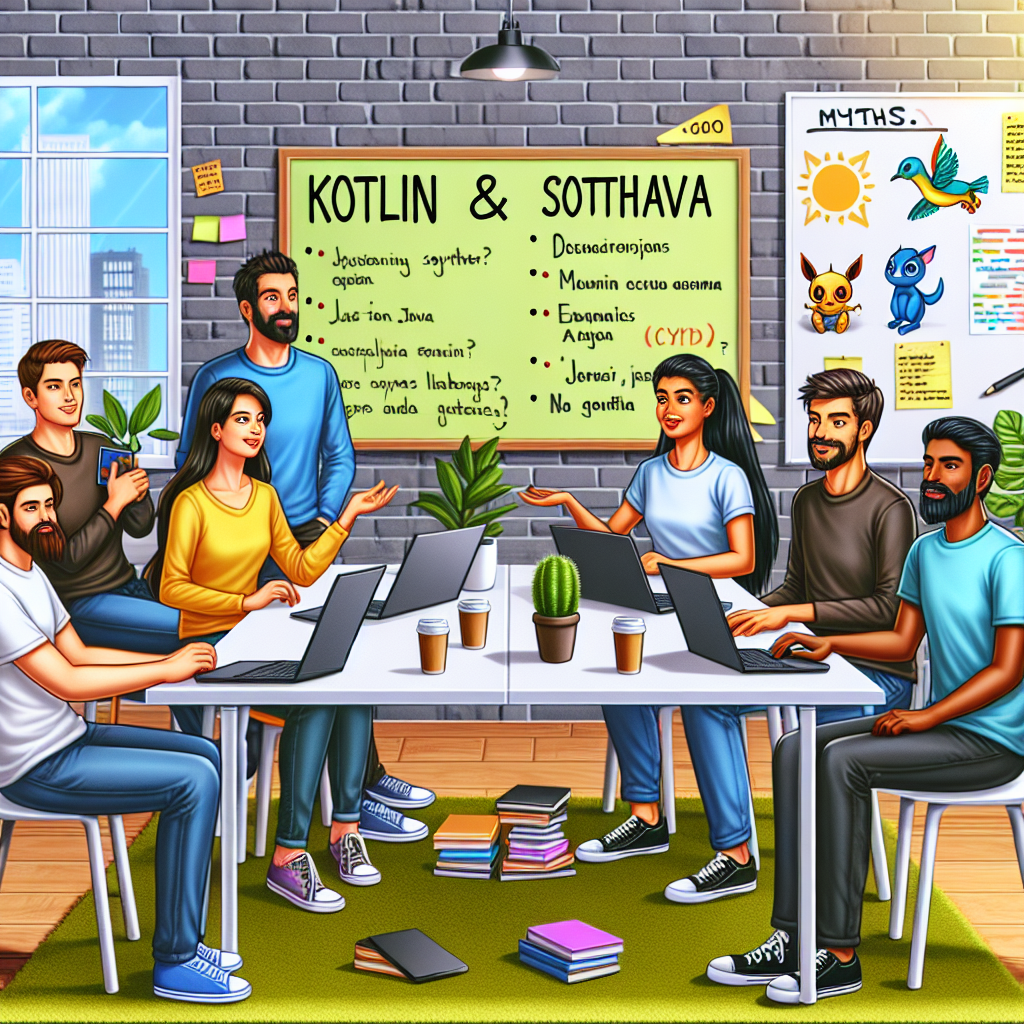Developing Android Applications and Cross-Platform Applications Using Kotlin and Java

Why Choose Android Applications Using Kotlin and Java for Your Business Growth?

In today’s digital landscape, the importance of a robust mobile application cannot be overstated ⭐. Imagine having an Android application using Kotlin and Java that perfectly caters to your customers needs while propelling your business forward. But why should you opt for these technologies? Let’s dive into it! ⭐
1. Tailored Solutions for Every Business
Whether you run a small local shop or a large enterprise, developing an Android application using Kotlin and Java makes it easier to tailor solutions that resonate with your target audience. By employing these languages, we ensure your app is not just functional but also user-friendly.
- ⭐ Custom functionality: Want a unique feature? Kotlin allows for rapid implementations.
- ⭐ Faster development: Java provides a reliable backbone that speeds up the process.
2. Expanding Your Reach with Kotlin
In recent years, Kotlin has become increasingly popular among developers. In fact, a survey indicated that over 70% of professional Android developers now prefer using Kotlin over Java. This popularity is largely due to its conciseness and ability to prevent errors early in the development process.
Consider this: a local bakery that wants to expand its reach could leverage an Android application using Kotlin and Java to offer delivery or pre-order services, making it easier for customers to enjoy their favorite pastries ⭐.
3. Statistical Overview
| Technology | % Preference |
| Kotlin | 70% |
| Java | 30% |
| Launch Speed | 50% faster with Kotlin |
| Maintenance Cost | 30% lower with Kotlin |
4. Real-World Success Stories
Let’s take a look at a real-case scenario: A small retail business struggled to keep up with customer demands during holiday seasons. By developing a mobile app using Android applications using Kotlin and Java, they transformed their customer engagement process. Customers could now check inventory levels, receive special offers, and even place orders directly from their phones. This simple shift resulted in a 40% increase in sales during peak seasons ⭐!
5. Expert Advice on IT Infrastructure and Application Development
Our seasoned specialists at Artivale, with over 20 years of experience, have the expertise to guide you through every aspect of application development. From integrating the latest features to ensuring your app’s security, we provide a full spectrum of services, all in one place. This means you dont have to juggle between multiple vendors. For instance, updating your app and maintaining security protocols should happen regularly to keep your business resilient in the digital age ⭐.
6. Cost-Effectiveness and Scalability
Cost plays a key role in the decision-making process. Thats why we offer competitive pricing without compromising quality. Developing an Android application using Kotlin and Java is an investment in your company’s future. For example, our Landing Page Development with Custom Code starts at just 1200 EUR, setting a solid foundation for your services ⭐.
If youre ready to elevate your business with a high-quality mobile application, reach out to us today! Contact Alexandra at [email protected] or visit artivale.com to get started. Don’t wait; your solution is just a call away! ⭐
Frequently Asked Questions
-
What are the benefits of using Kotlin for Android development?
Kotlin offers concise syntax, increased safety, and compatibility with existing Java code, enhancing productivity. -
How does Java compare to Kotlin for app development?
Java is established and widely used, while Kotlin provides modern features that reduce boilerplate code and potential errors. -
Can I develop cross-platform apps with these technologies?
Yes, using Kotlin Multiplatform, you can create apps for both Android and iOS effectively. -
How long does it take to develop an app using Kotlin and Java?
It varies by complexity, but with Kotlin, the development time can be significantly reduced. -
What kind of support do you provide post-launch?
We offer comprehensive support packages tailored to your needs to keep your app running smoothly. -
How secure are applications developed with these languages?
Both Kotlin and Java have robust security features, but regular updates and maintenance are crucial. -
Is there a risk of obsolescence with Kotlin?
Kotlin’s growing popularity and backing from Google make it unlikely to become obsolete anytime soon. -
How do I keep my app updated?
Regular updates are vital; we provide services to automate and manage this. -
What are the costs associated with developing an Android app?
Our prices are competitive, starting from 1200 EUR for basic landing page development, with scalable options for more complex projects. -
Can we integrate payment processing in our app?
Absolutely! We can seamlessly integrate secure payment gateways into your application.
How Creating a Cross-Platform Application on Kotlin Multiplatform Can Maximize Your Reach

Are you looking to extend your business’s reach beyond just Android users? Creating a cross-platform application with Kotlin Multiplatform might just be your ticket to success! ⭐ Imagine having a mobile app that works seamlessly on both Android and iOS, allowing you to connect with a larger audience without doubling your development costs. Let’s explore how this works! ⭐
1. Enhanced User Experience Across Devices
When you create a cross-platform application using Kotlin Multiplatform, you’re not just saving time and resources; you’re also enhancing user experience. By leveraging a single codebase for both Android and iOS, you ensure consistency in design and performance. This gives users the ability to navigate your app easily regardless of the device they’re using. For instance, a travel agency can reach both Android and iOS users by offering a uniform experience, whether they’re booking a trip on their phone or tablet. ✈️
- ⭐ Consistent UI: Users love familiarity! A uniform interface across platforms helps retain customer interest.
- ⭐ Broader Market Reach: Gain access to a wider audience of potential customers by catering to both Android and iOS users.
2. Cost-Effective Development and Maintenance
Building applications using Kotlin Multiplatform can drastically reduce costs. Instead of developing separate applications for Android and iOS, you write once, and it runs anywhere. According to studies, businesses can save up to 30% on development costs with cross-platform solutions. For example, a small restaurant that wants to launch a food delivery application can focus on a single codebase, minimizing not just development costs but also ongoing maintenance expenses over time. ⭐
3. Faster Time-to-Market
The tech world moves at lightning speed, and being the first to launch can give you a competitive edge. With Kotlin Multiplatform, your development team can share business logic across platforms, accelerating the process of app launch. It’s estimated that implementing a cross-platform approach can cut development time by about 40%. Imagine this efficiency for your project – whether it’s a new e-commerce platform or a fitness app! ⭐️♂️
4. An Ecosystem of Interoperability
With Kotlin Multiplatform, you can also leverage existing libraries and frameworks. This is a game changer. You don’t need to reinvent the wheel! You can utilize existing Java or Swift libraries in your application, saving time and effort. For example, if a startup wants to add a chat feature, they can pull in a library rather than coding everything from scratch. This promotes interoperability and adaptability in app development. ⭐
5. Real-World Application Scenarios
Let’s consider a real-world example: A fitness startup developed a cross-platform application aimed at health enthusiasts. Initially, they only targeted Android users, but after seeing positive feedback, they used Kotlin Multiplatform to go further. They integrated personalized workout plans and nutrition tracking, catering to Apple users too. This resulted in a boost of over 50% in user engagement and downloads after the iOS version went live! ⭐
6. Building a Community and Brand Loyalty
With a wider audience and seamless experience comes the need for community building. Having a cross-platform application allows businesses to create a loyal customer base. Customers who find your app user-friendly are more likely to recommend it to others. Think of a local gym that integrates social sharing features within their app. Members can easily share their achievements on social media, naturally marketing the gym to their friends and increasing brand loyalty! ⭐
7. Expert Guidance to Maximize Your Reach
At Artivale, we are experts in leveraging the power of Kotlin Multiplatform to match your needs. Our team, led by skilled professionals with over 20 years of experience, is here to help you create customized solutions that will maximize your reach ⭐. Whether you want to integrate payment systems or need a unique feature tailored to your brand, we’ve got you covered.
Are you ready to take your app to the next level? Give us a call at [email protected] or visit our website at artivale.com. Let’s work together to unlock your business’s full potential! ⭐
Frequently Asked Questions
-
What is Kotlin Multiplatform?
Kotlin Multiplatform allows developers to share code across different platforms, especially Android and iOS, simplifying app development. -
How does cross-platform development save money?
It enables the use of a single codebase, reducing the need for separate development teams for each platform. -
Is app performance affected with cross-platform development?
Not at all! With Kotlin Multiplatform, you can maintain performance while enjoying the benefits of shared code. -
Can I add native features to a cross-platform app?
Yes! Kotlin Multiplatform allows you to utilize native capabilities on each platform while keeping your core code shared. -
How long will it take to build my app?
While timelines vary, using Kotlin Multiplatform typically accelerates development compared to standard methods. -
Will my app be usable offline?
Offline functionality can be integrated seamlessly in cross-platform applications, just like native apps. -
Can I customize my app for each platform?
Absolutely! You can specify platform-related nuances while keeping the core logic common. -
Is Kotlin Multiplatform suitable for large enterprise apps?
Yes! Many large firms utilize it due to its scalability and flexibility. -
How often should I update my cross-platform app?
Regular updates are necessary! We recommend a schedule based on user feedback and technology trends. -
What if I want to transition an existing app to Kotlin Multiplatform?
Our team can guide you through the migration process to ensure minimal disruption to your users.
What Myths About Android Development with Kotlin and Java Are Holding You Back?

In the world of app development, especially when discussing Android development with Kotlin and Java, a slew of myths can cloud your judgment and prevent you from leveraging these powerful technologies. Are you stuck in a mindset that’s keeping your business from thriving? Let’s bust some prevailing myths and set the record straight! ⭐
1. Myth: Kotlin Is Just a Trend
One common misconception is that Kotlin is just a passing trend. Many believe it lacks long-term viability. In reality, Kotlin has been officially adopted by Google as a first-class language for Android development. Since its introduction, Kotlin has been embraced by a vibrant community, making it one of the top choices for developers. In fact, studies reveal that over 70% of developers prefer Kotlin for its modern syntax and features. Let’s face it; if you’re still clinging to Java, you’re potentially missing out on a wealth of opportunities. ⭐
2. Myth: Java Is Outdated and No Longer Relevant
Another myth surrounding Android development with Kotlin and Java is that Java is no longer relevant. While it’s true that Kotlin brings fresh ideas to the table, Java remains a solid foundation for many enterprise applications. Businesses still rely on Java for backend services and large systems. Its like comparing a classic car to a new electric vehicle; both have their merits! In fact, many apps successfully use a combination of both languages, allowing you to leverage the strengths of each. ⭐⚡
3. Myth: Learning Kotlin Is Too Difficult
Many developers hesitate to transition to Kotlin because they fear the learning curve. However, if you are already familiar with Java, making the switch to Kotlin is relatively easy! Kotlin is designed to be compatible with Java, which means you can gradually adopt it without completely overhauling your existing code. Plus, its concise syntax makes it easier to read and write – it’s like upgrading from a flip phone to a smartphone! ⭐
4. Myth: Cross-Platform Development Isn’t Feasible with Kotlin
Some believe that Kotlin can’t be used for cross-platform development, thinking it’s merely an Android-specific language. That couldn’t be further from the truth! With Kotlin Multiplatform, you can share significant portions of your code between iOS and Android platforms, maximizing your reach and minimizing costs. This myth could hinder your business’s ability to reach diverse customers across multiple platforms. ⭐
5. Myth: You Can’t Achieve High Performance with Kotlin
A misconception exists that Kotlin applications are slower than those written in Java. Performance issues typically stem from poor coding practices rather than the language itself. In fact, well-optimized Kotlin code can perform on par with Java. Many successful applications debunk this myth by proving that Kotlin doesn’t compromise on performance; it enhances it through reduced boilerplate code, leading to more efficient apps. ⭐
6. Myth: Kotlin Development Is Expensive
Another myth worth debunking is the belief that using Kotlin will inflate your development costs. In reality, while initial investments might seem higher, the long-term benefits outweigh them. By speeding up development time and lowering maintenance costs—often leading to savings of 30% or more—Kotlin can be more cost-effective than relying on Java alone. An app that’s built faster is also launched sooner, tapping into the market earlier! ⭐
7. Real Client Stories: Overcoming Myths
Consider this example: A retail business wanted to expand its app capabilities but was hesitant due to myths surrounding Kotlin. After consulting with us at Artivale, they learned how easy it could be to adopt. They transitioned from Java to implementing Kotlin Multiplatform and witnessed a 40% reduction in their development costs and a much-improved user engagement rate. Now, they can enjoy the best of both worlds, all while dismissing outdated myths! ⭐️
8. Expert Guidance to Dispel Your Concerns
If myths are holding you back from exploring the potential of Android development with Kotlin and Java, it’s time to clear the air. Our team of expert developers at Artivale is here to guide you through the transition. With over 20 years of experience, we have helped countless clients navigate the complexities of app development, ensuring a smooth and successful process. Ready to break free from the myths that are limiting your business? Connect with us at [email protected] or visit artivale.com today! ⭐
Frequently Asked Questions
-
Is Kotlin really a good choice for Android development?
Absolutely! Kotlin is officially supported by Google and offers many advantages, such as concise syntax and reduced boilerplate. -
Are apps developed in Kotlin slower than those in Java?
No, performance issues often arise from coding practices, not the language itself. Well-written Kotlin can perform exceptionally well. -
How difficult is it to learn Kotlin?
If you have a background in Java, transitioning to Kotlin is quite smooth, thanks to its compatibility with Java. -
Can I use Kotlin for cross-platform development?
Yes! With Kotlin Multiplatform, you can effectively share code across Android and iOS, optimizing your resources. -
Will using Kotlin increase development costs?
While initial costs may be higher, the long-term savings due to faster development and lower maintenance often make it more cost-effective. -
Is Java still relevant in 2023?
Yes! Java remains a major language for many enterprise solutions and backs several legacy systems. -
What if my existing app is in Java?
You can gradually introduce Kotlin for new features without rewriting everything, as Kotlin is compatible with Java. -
How long does it take to develop an app in Kotlin?
Development time varies based on complexity, but using Kotlin can significantly speed up the process! -
Are there community resources for learning Kotlin?
Absolutely! There’s a large community with extensive resources, tutorials, and forums to help you on your learning journey. -
Can I integrate Kotlin with existing Java code?
Yes! Kotlin is designed to interoperate fully with Java, so you can integrate it wherever you need.
Submit your details in the form and our team will personally get in touch with you within the next business day to discuss your needs
